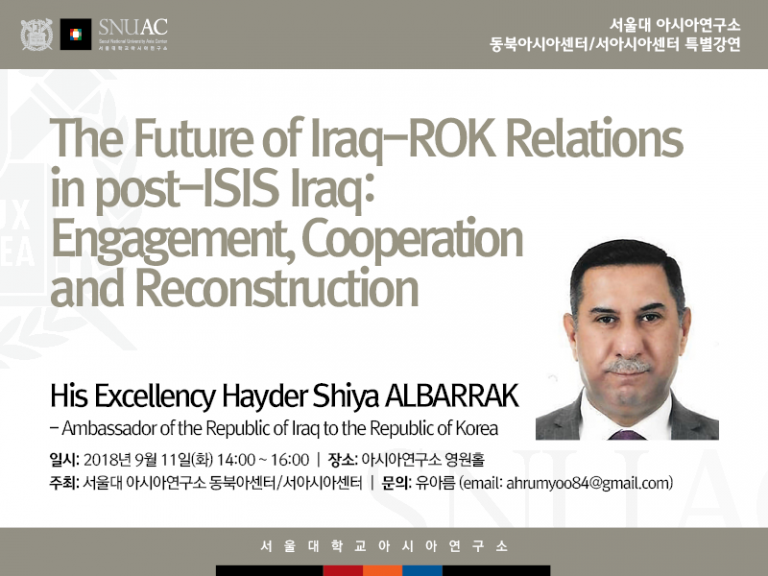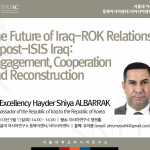
The Future of Iraq-ROK Relations in Post-ISIS Iraq: Engagement, Cooperation, and Reconstruction

Special Lecture
- Date & Time: Tuesday, 11 September, 2018, 14:00-16:00
- Venue: Youngwon Hall (#210), SNUAC(Bldg#101)
- Speaker:
His Excellency Hayder Shiya ALBARRAK
(Ambassador of the Republic of Iraq to the Republic of Korea) - Hosts: SNUAC Northeast Asia Center & West Asia Center
- Inquiry: Ahrum Yoo / ahrumyoo84@gmail.com
*Sectarian questions will not be answered during the Q&A session.
Abstract
ABOUT THE SPEAKER
Prior to his appointment as Iraqi Ambassador to the Republic of Korea, Ambassador Hayder Shiya Albarrak, he served as accredited ambassador to the Republic of Bulgaria (2004-07) and the Republic of Azerbaijan (2010-15). In Iraq, he has served as First Deputy Member of the Former Iraqi Governing Council from 2003 to 2004, a capacity in which he participated in drafting the first transitional Iraqi constitution post-Saddam Hussein’s dictatorship. A career diplomat, he has served in various capacities in the Iraqi Ministry of Foreign Affairs, as Head of Policy Planning Department, Head of Africa Department, and as Head of Press Department. Ambassador Albarrak holds a B.A. in English Literature from Baghdad University and a B.A. in Law from the University of Babylon in Iraq, and an M.A. in International Relations from Khazar University in Baku, Azerbaijan.
ABSTRACT
In Iraq, political reestablishment and policy implementations for economic recovery are underway. Amidst the volatility of global oil prices, Iraq looks to upping its game in oil production for economic revival within the OPEC, with a projection of production levels at 5 million barrels per day. South Korea, among other major Asian economic partners China and Japan, serve a critical role for engagement and cooperation toward the reconstruction of Iraq. What specific engagements and contributions by Asian economic partners are anticipated in the process? What are the concrete steps in Iraq-ROK relations going forward? More importantly, how will the interplay of China, Russia, and the U.S. in the Middle East influence such future paths going forward?
*Keywords: Iraq, South Korea, ISIS, Gulf Oil, Infrastructure, People-to-People Exchange
